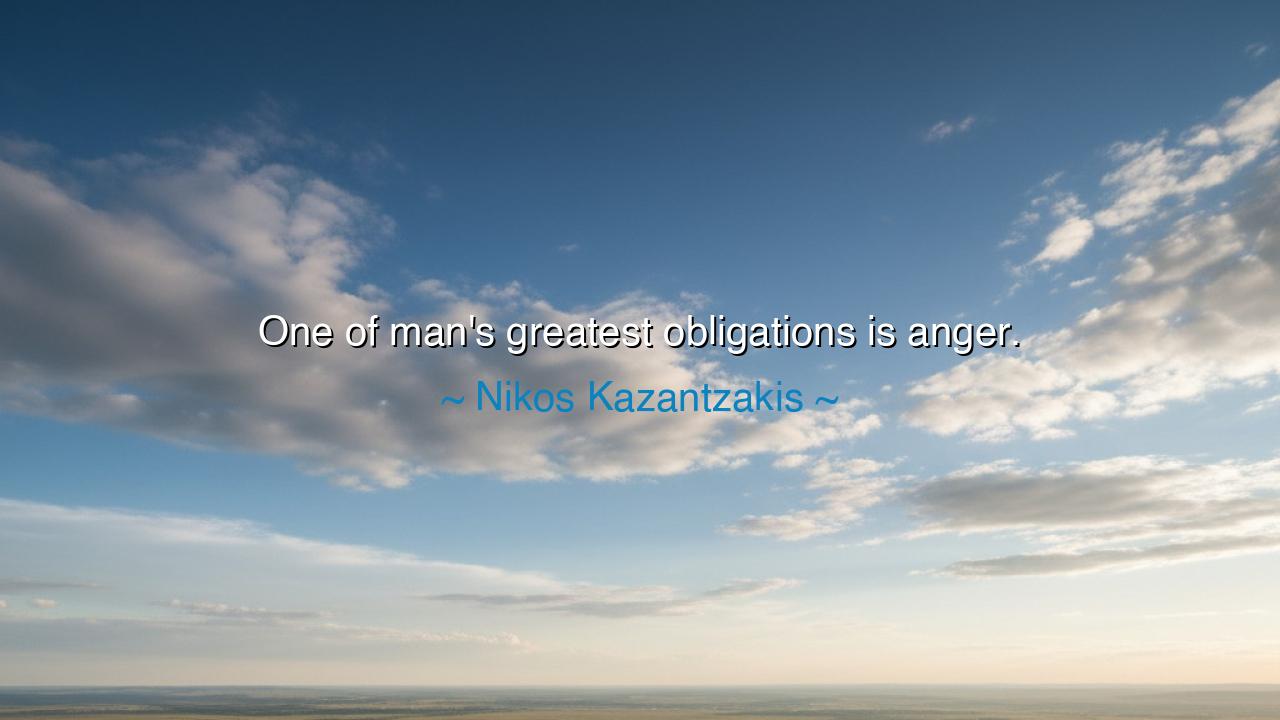
One of man's greatest obligations is anger.






Host: The room is dimly lit, the quiet of the evening settling in around them. Outside, the world is winding down, but the air inside is still, heavy with the weight of the conversation waiting to unfold. Jeeny sits at the table, a cup of tea in front of her, her fingers tracing the edge of the cup absentmindedly. Jack stands near the window, his back to the room, staring out into the deepening night. There’s a soft tension between them, as though something unspoken is about to be shared.
Jeeny: “I read something today by Nikos Kazantzakis that really stuck with me. He said, ‘One of man’s greatest obligations is anger.’” She turns to Jack, her voice gentle, but with a trace of curiosity. “What do you think he meant by that?”
Jack: He pauses, his eyes narrowing slightly as the words linger in the air. “Anger... as an obligation?” His tone is thoughtful, but a hint of skepticism creeps into his voice. “I get that anger can be a powerful emotion, something that can drive you to action, push you to change things. But an obligation? That’s a pretty heavy way to frame it.” He looks out the window, his voice growing reflective. “Is anger really something we’re supposed to embrace or just something we need to control?”
Jeeny: “But maybe that’s the point, Jack,” she says softly, her voice calm, but insistent. “What if anger isn’t something we should suppress, but something we should recognize as part of being human? It’s not about giving in to rage, but understanding that anger can be a catalyst for change, for standing up for what’s right. Kazantzakis wasn’t saying that anger should define us, but that we have an obligation to channel it, to use it for something meaningful.” Her gaze is steady as she continues, “When things aren’t right, when we see injustice, anger is the spark that drives us to fight for better.”
Host: The stillness between them deepens, as Jeeny’s words start to settle into the space between them. Jack stands quietly, his posture now more relaxed, but the question still lingers.
Jack: “I see what you’re saying,” he replies slowly, his voice softer, more considerate. “But is there a point where anger just becomes destructive? Like, if we let it control us too much, doesn’t it risk consuming everything else?” He runs a hand through his hair, his voice taking on a concerned edge. “Sometimes I feel like people can get so caught up in their anger that they forget what they’re fighting for in the first place.”
Jeeny: “That’s true,” she says, her voice gentler, a quiet understanding in her tone. “But I think Kazantzakis is talking about the awareness of anger. It’s not about letting it control us or defining us, but about acknowledging it and knowing what to do with it. When you feel anger in response to something that’s unjust, it’s an emotion that’s meant to lead you to action, to change. But if you let it fester and turn into resentment, then yes, it becomes toxic.” She leans forward slightly, her expression earnest. “Anger is a tool—a tool that, if used correctly, can create real transformation.”
Jack: “So, you’re saying it’s about purpose,” he says thoughtfully, his voice softer now. “That anger is only as valuable as the action it motivates. If you’re angry at something, you use that anger to push for change, not to tear things down without a cause.”
Jeeny: “Exactly,” she replies, her voice calm and steady. “Anger is powerful, but it has to be directed. It’s the emotion that drives people to stand up against oppression, to fight for equality, for justice. But if we don’t understand it, if we don’t use it consciously, it can turn inward, or spiral out of control, leading to more harm than good.” Her gaze is soft but conviction fills her words. “It’s about awareness of the responsibility we have to act with that anger.”
Host: The room feels quieter now, the air between them thick with understanding. Jack remains still, his thoughts clearly settling into the words Jeeny has shared. The weight of anger as a tool for good, rather than something destructive, has shifted his perspective.
Jack: “I think I understand,” he says, his voice quieter now, more reflective. “Anger isn’t the enemy. It’s what you do with it that matters. We all get angry, but it’s how we channel it that makes the difference between progress and destruction.”
Jeeny: “Exactly,” she says softly, a quiet affirmation in her voice. “It’s not the feeling itself, but how we choose to respond to it. Anger can be a force for good, if we use it with purpose.”
Host: The conversation lingers in the room, the weight of it sitting comfortably between them, like a quiet revelation. Jack looks at Jeeny, his expression now more open, almost grateful for the new understanding. The world outside continues, but inside, the air feels a little lighter, a little more clarified.
As the night deepens, the understanding between them settles: anger isn’t something to fear or suppress, but something to recognize, to use purposefully. It’s a force that, when understood, can be the spark that drives us toward change. And in that, it holds great power.






AAdministratorAdministrator
Welcome, honored guests. Please leave a comment, we will respond soon